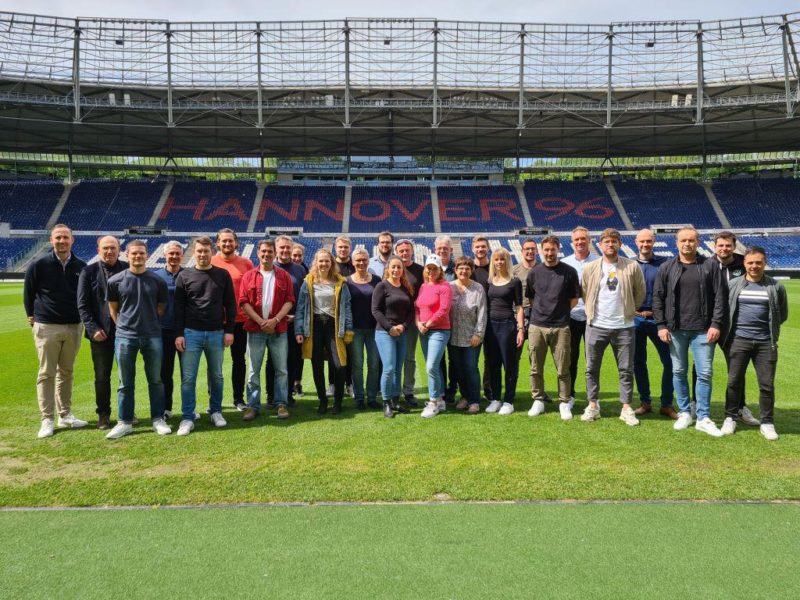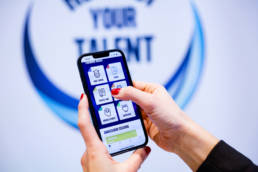Rethinking dual careers in football: The Hannover 96 Academy’s “Plan A” initiative, in partnership with TWIN, progresses to the next stage. We have completed two days of collaboration on their talent development model.
The relevance of the dual career topic for football is quickly explained. Only 13% of professional footballers in Europe have post-school vocational education – compared to 53% of the male population in the EU (FIFPro, 2019). Additionally, long-term unemployment is three times higher among low-qualified workers than among those with high qualifications (European Commission, 2016).
However, a dual career represents more than just a safety net for the future. Systematically engaging in activities alongside sport and sport career transition planning shows a significant positive impact on athletic engagement, sporting performance and career tenure (Saunders, J., & Pink, M., 2014; Lavallee, D., 2019). In addition, a dual career can foster mental health of players in and beyond the sporting career, as the exploration of occupational or ideological alternatives to sport acts preventively to athletic identity foreclosure, and contributes to a balanced lifestyle (Brewer, B., & Petitpas, A. J., 2017).
Dual career in German football academies
The partnerships between professional clubs’ academies, Elite Schools of Football, and the DFB aim to help aspiring football players in Germany balance football training and education. Hannover 96, currently playing in 2. Bundesliga, and KGS Hemmingen, a comprehensive school, have been working together for 15 years as part of one of 38 such national programmes. Since 2021, TWIN has provided a wide range of consulting services to the dual career model, leading to the joint development of the concept “Plan A”.
Plan A
While dual careers have traditionally been viewed as a fallback for players, this perspective misses the potential of merging football, education, and personal development to boost on-field performance. This is where the innovative power of the dual career approach shines.
“Today’s scope of the game goes far beyond the football pitch. For young players to achieve long-term success, they must also master their game-around-the-game.”
Wolfgang Stockinger
Founder & CEO, TWIN
In keeping with this philosophy, dual careers should not be seen as a “Plan B”, but rather as an essential part of performance-oriented training models in professional football. Encouraging varied interests and developing life skills helps shape a holistic identity in young players, positively impacting their personal stability amid the dynamic demands of the football industry, taking into account both present and future factors.
Strategic consulting
Programme meetings with the Hannover 96 Academy and school management of KGS Hemmingen served to outline next actionable steps to take Plan A to new heights. The aim is to maximize both systemic and individual potential.
An interim result of the meetings has led to a planned focus on game-around-the-game training for players, and optimizing counselling services in the upcoming programme period.
Team trainings
Whether in clubs or in sport schools: people working closely with athletes are in the front line of service delivery. Dual career models can only sustain a high-performing system by improving their people, and by building collaborative, engaged teams.
TWIN Master Classes offer team training to enhance services, teams, and overall system performance. In Hannover, TWIN Founder & CEO Wolfgang Stockinger conducted two of these trainings: one centered on game-around-the-game, the other on athlete counselling.
Part 1: Game-around-the-Game
In professional sports, performance pressures can heavily impact athletes. A workshop held in the Hannover 96 Heinz von Heiden Arena addressed the challenges of young football players, emphasized the importance of comprehensive player support, and introduced participants to Plan A and its concept of game-around-the-game training. Football coaches, sport psychologists, and teaching staff discussed the value of collaboratively implementing the dual career model to provide players with stability, security, and a more comprehensive skill set.

Part 2: Athlete counselling
Athlete counselling is a professional dialogue between a qualified service provider – trained in psychology, psychotherapy, or counselling – and an athlete. In the present scenario, the service focuses on the phases and transitions of a dual career. The primary mission is to enhance the player’s adaptability and decision-making ability. Through counselling, players are encouraged to reflect on their individual needs, interests, skills, and resources, leading to a deeper self-understanding of their situation.
A full day TWIN Master Class brought together the sport psychology department of Hannover 96 Academy, the school counselling of KGS Hemmingen, and its dual career programme coordinators. The training aimed to share fundamental principles of TWIN’s international athlete counselling service, help participants evaluate their own counseling approach, and draw conclusions for optimizing system services in line with Plan A.
•
•
•
🚩 TWIN aims to help raise standards in athlete support. Our Master Classes are staff training sessions tailored to your institutional needs. If you are interested in having one of our experts deliver a customized workshop, please submit a request.
References
- Lavallee, D. (2019): Engagement in Sport Career Transition Planning Enhances Performance. In: Journal of Loss and Trauma 2019, VOL. 24, NO. 1, 1–8
- Saunders, J. & Pink, M. (2014): The Relationship between Player Off‐field Engagement and On‐field Performance: Final Report. An AFL Research Board Study
- Brewer, B., & Petitpas, A. J. (2017): Athletic identity foreclosure
- FIFPro (2019): Mind the Gap: Take control of your next career
- European Commission (2016): Long-term unemployment: Council Recommendation




